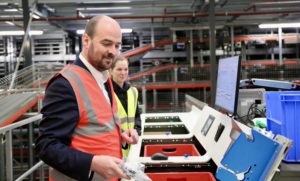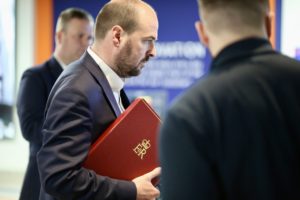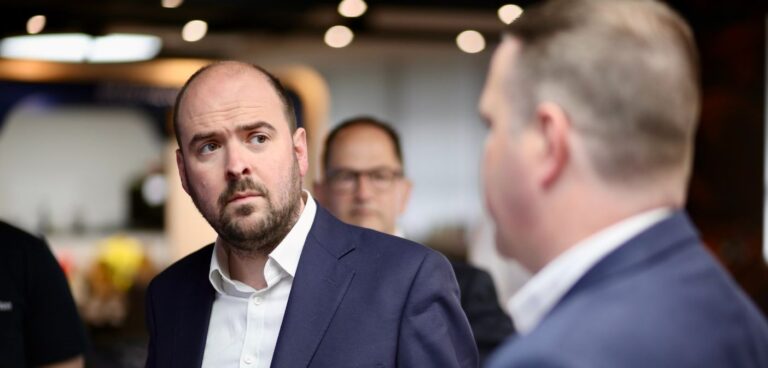On 27 April, Parliamentary Under Secretary of State at the Department for Transport Richard Holden MP visited Wincanton’s site in Corby. James McLoughlin from Logistics Manager went along to see the site and speak to the minister about the challenges that supply chains are currently facing, government schemes to improve the industry, and the future of logistics.
Arriving in Corby, Richard Holden MP was met by Wincanton’s Chief Customer & Innovation Officer Paul Durkin, Product Director for Automation & Robotics Scott Merrick, and Graduate Trainee Manager Alistair Lower. They showed the minister around Wincanton’s W² Innovation Centre, where he was introduced to a range of different technologies used in the facility, including the robotics solution that won the ‘Best Use of Robotics’ award for Wincanton and Neal’s Yard Remedies at the 2022 Supply Chain Excellence Awards.
Neal’s Yard Remedies and Wincanton won the award in the ‘Best use of Robotics’ category at the Supply Chain Excellence Awards in November 2022. Click here to find out more about this year’s awards.
Afterwards, the MP was taken on a tour of the WEB – Wincanton’s e-fulfilment facility – and saw firsthand how technology is being used to automate processes and assist staff at the site. He even tried his hand at picking using an automated goods-to-person picking system.

Holden then sat down for an interview with Logistics Manager. Here’s what he had to say:
How is technology like what you’ve seen at Wincanton today making a difference in the logistics industry?
Speaking to some of the guys here, they have, over the last couple of years, had some squeezes on labour. I want to ensure that a logistics profession is really an attractive option for people right across the board, and also something people want to go into rather than just fall into. I think today, actually, with the amount of innovation and tech that’s here as part of this entire site, it just shows you that this is an industry that is evolving very quickly to make massive productivity gains – yes – but also, that’s all through tech, and there’s some pretty high-end stuff that’s going on to really transform the sector.
How important are schemes like the Freight Innovation Fund in bringing new technologies to the sector?
I think they are absolutely massive. They’re particularly important for that pipeline of SMEs. We’re developing a lot of the early stage work and then getting it actually in place with some of our larger businesses. But one of the things that I’m always pushing for is to ensure that that technological innovation gives as much benefit to businesses here in the UK, and doesn’t go abroad. I’m hoping that our continued work with the Freight Innovation Fund helps us in that space as well, and in a lot of different areas. It can cover everything from stuff we saw today but also things out on the road as well. So there’s lots of different elements to it and I want to continue to have as many diverse, different ideas coming into that R&D space as possible.

We heard earlier that the average age of a truck driver at Wincanton is around the mid-50s. How successful has Generation Logistics been in bringing younger people and a new generation to the sector?
Generation Logistics is about making an open, modern industry. I think some of the practical stuff on the road as well, like the [investment in improving] truck stops is also important. But then on the other side, you’ve also got to think about the future of the sector from warehousing and other sides, which is places like this, and also the ramps going into the back of the trucks, it’s all about unloading and all that sort of thing as well.
I think it’s about ensuring that all parts of the industry are at the level that we want to see them at. Some areas are moving faster than others, but I’m determined to ensure that as part of the broader 33-point plan we address all of those different spaces, because I don’t want to see any part of the industry scrambling around when I want it to be seen as a positive employment choice for people at every stage.
How important is it that the industry reaches net zero targets and what’s going to be most important in reaching those goals?
It’s vitally important – we’ve got those long-term targets of 2040 and earlier for the smaller vehicles as well, but I think actually we need to go further than that in some ways and look at what we can do quicker. I think some of that is around the innovation side as well. So while yes, we’re looking at slightly longer-term than cars to take diesel out of new trucks, I think actually a third of the industry is working on refrigerated [logistics] and decarbonising that part of [the supply chain] could be a good step along that path as well.
I’m hopeful that actually we’ll be able to see technological innovation which decarbonises certainly some parts of the sector even faster than we’ve set out in statutory guidelines, because I think it’s what people want to see and I think it’s what customers want to see as well. I think we’ll find that as the technology improves, the industry is going to move [towards net zero] anyway.
I think there’s a broader question around some of the really large lorries as to the exact future, whether it’s going to be more hydrogen-based or whether its going to be battery-based, but I think when it comes to decarbonising parts of [the industry], we can definitely move ahead in other parts of it, particularly on the refrigeration side, at a quicker speed.
Richard Holden MP gave a presentation at the co-located IntraLogisteX and Robotics and Automation exhibitions in March 2022. Visit either website for more information on next year’s events.







